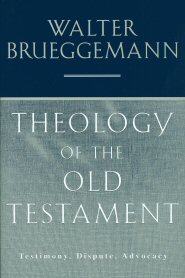Theology of the Old Testament: Testimony, Dispute, Advocacy
A review of Walter Brueggemann's, "Theology of the Old Testament: Testimony, Dispute, Advocacy," by Dr. M. Daniel Carroll R.
Brueggemann, Walter. Theology of the Old Testament: Testimony, Dispute, Advocacy. Minneapolis: Fortress, 1997. $48.00. Hardback. 777 pp.

From the immensely creative pen of Walter Brueggemann comes this provocative approach to Old Testament theology. This well-known scholar has been known for weaving his textual studies with insights from a variety of disciplines and for striving to make his work relevant to the pressing issues of modern life. This book is another exemplary model of those commitments.
Brueggemann begins his discussion by describing his perspective on the social and theological environment within which an Old Testament must be elaborated today. To begin with, any interpretation now takes place within a pluralistic context, a reality which for him is both challenging and enriching. He particularly champions what he calls the “efforts at the margins,” those works arising from within the struggles of feminist, liberationist, and black theologies. No point of view, therefore, can be a final word, an absolute judgment on God and the world. In addition, while the author is very concerned to develop his theology for the Christian Church, at the same time he continually tries to enter into dialogue with the Jewish tradition. The Old Testament, Brueggemann says, is both a Jewish and a Christian book.
As a final methodological point, Brueggemann points out how recent trends in scholarship have led to a move away from the hegemonic classical critical approaches to the incorporation of contributions from sociological and rhetorical criticism. Sociological approaches help to underscore the impact of the social location of the reader on interpretation and also can provide insights into the concrete realities of ancient Israel. For its part, rhetorical criticism focuses on the final form of the biblical text (not on hypothetical earlier redactions) and explores the power of that text on the imagination. The ultimate goal of theology, Brueggemann believes, is to stimulate a new imagination – in other words, a new way of looking at God and life that, on the one hand, is faithful to the Christian community, tradition and the biblical text, and that, on the other hand, is willing to engage other competing versions of reality that might be destructive to humankind.
As the subtitle suggests, the guiding metaphor for this theology is the courtroom. The biblical text contains testimonies and countertestimonies concerning the person and activities of God. That is, the Old Testament offers positive portrayals of who God is and what he does (“Israel’s core testimony”; Part I, chpts. 3-7); but it also contains expressions of frustration at God’s hiddenness and the apparent contradictions of his person and actions (Part II, chpts. 8-12). The idea is that the Old Testament does not have a seamless and totally coherent view of God. The God of the Old Testament, though, is at bottom very relational and in his freedom has entered into `partnership’ in various ways with Israel, individuals, the nations, and creation (Part III, chpts. 13-18). This testimony is embodied and mediated (Brueggemann’s terms) within the text through Israel’s institutions and people.
This volume presents a whole array of notions that will certainly elicit responses from its readers. For example, while Brueggemann is at his best in exploring the power of the text to express life with God, both then and now, some will be uncomfortable with his explicit decision to avoid issues of historicity and ontology; language itself becomes the grounding of his theology. This commitment perhaps is understandable because of his theological background, but evangelicals would probably not so easily negotiate those fundamental concerns away. In addition, while he is right to highlight the impressive variety of and conflict between views and experiences of God in the Old Testament, evangelicals once again might see greater coherence because of their own theological presuppositions.
Whatever caveats could be mentioned concerning this theology, I highly recommend the volume because of its insightful contributions to how one might read the Old Testament for profit… not only as an academic exercise, but also for making a difference as to how the people of God envision God and their life within the world today.
M. Daniel Carroll R.
Professor of Old Testament
Denver Seminary
